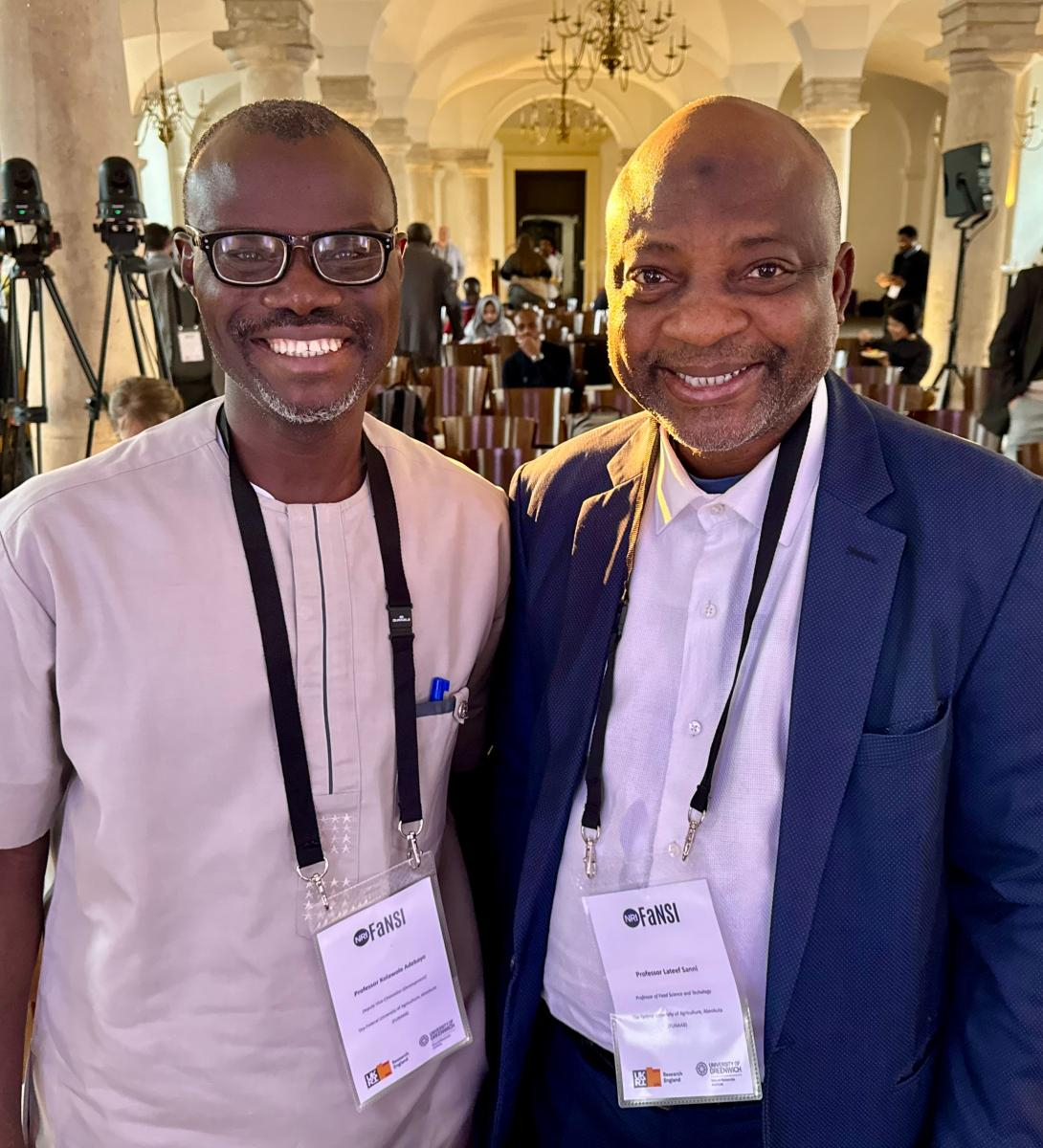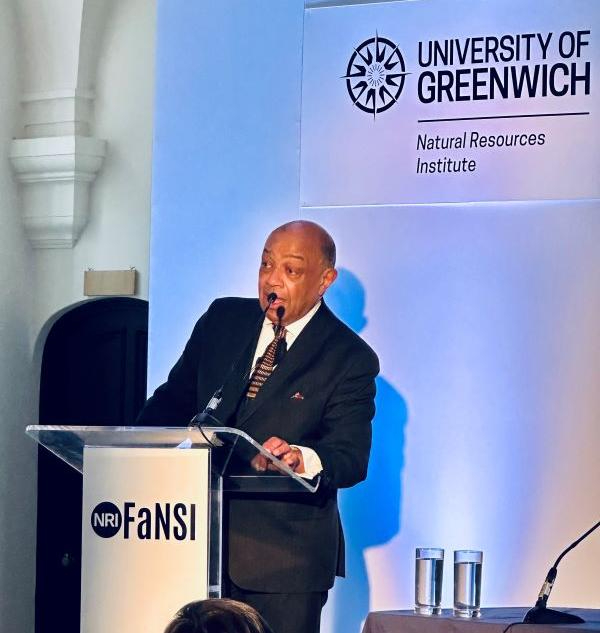
NRI successfully hosted the International Conference on Food and Nutrition Security in Africa from 20-21 February 2024 at the University of Greenwich campus in London. Organised as part of NRI’s Food and Nutrition Security Initiative (FaNSI), the event convened around 98 people from local and international academic institutions, research organisations and inter-governmental organisations. The conference featured presentations from invited speakers, NRI researchers, students and FaNSI partners, who shared their research results and experience highlighting challenges and potential solutions for food and nutrition security in sub-Saharan Africa.
The conference was also an opportunity to take stock of the past four years of the FaNSI programme at NRI. Established in 2019, FaNSI aimed to broaden NRI’s interdisciplinary research capacity, working in collaboration with partner organisations, to address the challenges of food and nutrition insecurity, especially in Africa. Through research capacity development, FaNSI was designed to generate knowledge that creates positive social change.
 The initiative focused on strengthening four key thematic areas of expertise at NRI: Food Systems for Improved Nutrition, Food Loss and Waste, Sustainable Agricultural Intensification, and Climate Change. By integrating these areas with other complementary research fields in a food systems approach, the initiative sought to establish a pioneering research capacity to address the needs of vulnerable populations. It also sought to explore interactions between improved nutrition, environmental protection, economic growth, social sustainability and the implications for policy. Conference participants deliberated on how to build on current efforts to deliver impact on various dimensions of FaNSI priority areas.
The initiative focused on strengthening four key thematic areas of expertise at NRI: Food Systems for Improved Nutrition, Food Loss and Waste, Sustainable Agricultural Intensification, and Climate Change. By integrating these areas with other complementary research fields in a food systems approach, the initiative sought to establish a pioneering research capacity to address the needs of vulnerable populations. It also sought to explore interactions between improved nutrition, environmental protection, economic growth, social sustainability and the implications for policy. Conference participants deliberated on how to build on current efforts to deliver impact on various dimensions of FaNSI priority areas.
In her keynote address, NRI Director, Professor Sheryl Hendriks, acknowledged the complexity and interconnectedness of food systems and noted that implementation across development planning is key to delivering necessary food systems changes. ‘If we don’t shape food systems appropriately, they won’t go where we want them to. We need to think through and find a fine balance between choices and trade-offs as all public policy choices have trade-offs affecting food systems’, she said.
Chancellor of the University of Greenwich, The Rt Hon The Lord Boateng expressed confidence in NRI’s capacity to contribute to global food and nutrition security and research in general. He challenged the FaNSI team to capitalise and build on NRI’s long experience – spanning over 130 years – as a global leader in collaborative research and innovation. ‘Ensuring fairer, sustainable, healthy food systems will require a shift to systemic accountability, enabling environments, and comprehensive measurements and metrics’, he advised.
Participants acknowledged the value of collaboration, partnerships and multidisciplinary approaches in addressing complex food systems challenges. They also recognised the need for radical thinking to deliver the food systems transformations required for global food and nutrition security. Crucially, the importance of generating evidence to support policy decisions was highlighted, along with the vital need for close working relationships among all actors to drive sustainable food systems transformation.
FaNSI was funded from 2019 to 2024 by Research England under the ‘Expanding Excellence in England’ (E3) Programme, which supports the strategic growth of excellent research units in higher education institutions in England. Over the last four years, FaNSI has increased NRI’s staff capacity by 22 members, and invested in infrastructure for scientific experimentation and support to local food entrepreneurs, by establishing an agronomy laboratory, a climate change greenhouse and a Food Innovation Centre. FaNSI staff have developed a new MSc course in Global Sustainable Development, and partnerships have grown and developed.
Follow the links below to view the conference sessions.
Day 1: 20 February
Welcome remarks: The Rt Hon. The Lord Paul Boateng, Chancellor of University of Greenwich.
Keynote speaker: Professor Sheryl Hendriks, Director of NRI
THEME 1 Food systems and nutrition. Moderator Dr Christopher Turner
Keynote: Prof. Amos Laar, U. of Ghana. Making healthy food environment policies palatable in Africa: lessons from Ghana.
NRI staff Presentations. Strengthening food systems in the face of climate change and food insecurity; Political economy analysis of the food Industry; Simple tools to help micro, small and medium enterprises; Understanding the persistence of malnutrition in the Sahel.
NRI PhD student presentations. Food systems and contribution of small fish to human diet and nutrition; Development of ready to use therapeutic food; Remote diet data collection; Dietary drivers in urban food environment.
Keynote: Prof. Joyce Kinabo, Sokoine U. of Agriculture, Tanzania. A food systems approach to understanding and supporting contributions of small pelagic fish to human diets and nutrition
Sophia Schuff, Gehl Architects, Designing thriving foodscapes.
THEME 2 Food loss and waste reduction. Moderator Prof Ben Bennett
Prof. Brighton Mvumi, U. of Zimbabwe. Food loss & Waste in durable food systems in SSA, emerging trends, challenges and opportunities in the fight against hunger.
Prof. Linus Opara, University of Stellenbosch, South Africa, Building Africa’s capacity for postharvest loss and food waste reduction: role of university-led research.
Student presentations: Food safety & food waste; Biological hazards in animal products; Control of postharvest decay in apples; Food safety in butchers’ shops, Acrylamide risk in sweet potatoes.
Panel discussion - priorities for future action, followed by plenary discussion and summary
Day 2: 21 February
Keynote speaker: Professor Marta G. Rivera-Ferre, Spanish National Research Council, Inst. for the Management & Innovation of Knowledge, INGENIO (CSIC-UPV).
THEME 3: Inclusive innovation for sustainable agricultural intensification (SAI). Moderator Prof Jonne Rodenburg
Prof Anna Mdee, University of Leeds. Just add Women and Youth – the political economy of addressing equity and social sustainability in SAI.
Dr Leo Zulu, Michigan State University, Empowering agriculture: nurturing social gender and youth equity in sustainable intensification in SSA.
NRI staff and student presentations: Spatial landscape for understanding dynamics and multi-aspects of SA; SA Practices: enset and farmer-led drought tolerance trait selection; Soil health.
Dr Zainab Oyetunda-Usman, Rothamsted Research UK. Addressing barriers to digital credit for rural resilience.
Prof. Kolawole Adebayo, FUNAAB Nigeria, Context, inclusion and equity issues for African smallholder farmers in sustainable agricultural intensification systems
Plenary discussion and closing Prof Rodenburg.
THEME 4 Climate Change. Moderator Prof John Morton
Dr Zinta Zommers, climate change lead, UN Office for the Coordination of Humanitarian Affairs, Vice Chair of the IPCC. Linkages between climate change, food security and need for humanitarian action
Laxmi Pant, NRI. Alternative food movements as contested vehicles for climate justice.
Mofakkarul Islam, NRI. Climate change and farmer-herder conflicts in Nigeria.
Uche Okpara, NRI. Thermal discomfort and conflict.
Plenary discussion
Conference closing remarks: Prof. Sheryl Hendriks


